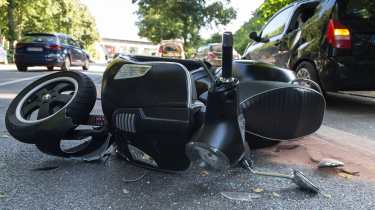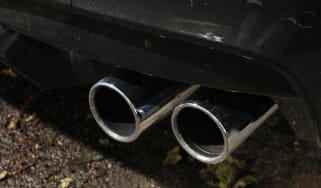Car insurance scams: expert advice on how to avoid them
A top expert from the Insurance Fraud Bureau gives us the lowdown on common car insurance scams and ways to protect yourself from them.

Reckless car insurance scammers on mopeds have targeted more than 4,000 victims, with fraudulent insurance claims now topping £70 million.
That’s the startling claim of the Insurance Fraud Bureau, which is working with the City of London Police to investigate an issue that’s reached a scale described as ‘unprecedented’. The ‘crash for cash’ moped scam is especially prevalent in South and West London, and there are signs that criminal perpetrators are becoming more targeted in their approach by picking on vulnerable victims.
“The scale and impact of moped insurance scams is unprecedented and has grown to become one of the largest, most complex Crash for Cash investigations we’ve ever seen,” says IFB director Ursula Jalllow. “Thousands of people have been targeted, and these shameless scammers’ tactics are becoming increasingly aggressive. For instance, we've found women who are driving alone or with their children are being targeted more.”
Moped scammers are mostly targeting Londoners, but the IFB is warning the trend could spread to other parts of the UK where road users may be less suspecting. However, moped riders ‘crashing for cash’ is just one example of the types of fraud drivers need to be on the lookout for. We spoke to Nicola Smith, Intelligence & Investigations Manager at the IFB, for an up-to-date appraisal of the current risks.
Common UK car insurance scams
The IFB is a not-for-profit organisation funded by the insurance industry, and one of its key functions is sharing data that helps individual companies to identify fraud - and potential fraudsters. So here’s what drivers and consumers should be looking out for.
Ghost broking
This is a particularly prolific kind of scam. According to Nicola, of the 50,000 fraudulent motor insurance policies uncovered in the last 12 months, thousands have been linked to so-called ‘ghost brokers’.
“A ghost broker is an individual purporting to be an insurance broker but who isn't authorised by the Financial Conduct Authority to provide those kind of services,” she says. ”They usually sort of operate on social media or Facebook or Instagram, and they often target younger individuals whose legitimate insurance policies would probably cost a fair amount.”
These crooks can operate in several different ways, but a common practice is to initiate an insurance policy on behalf of a customer, but manipulate details to reduce the premium. “They may still charge an inflated cost to the customer, but essentially the policy will be invalid because the details provided are incorrect,” says Nicola.
In other cases, she says, ghost brokers won’t initiate a policy at all, and are simply extorting money from victims. In either case, drivers with concerns can make a precautionary check that their vehicle is insured via the Motor Insurance Bureau’s ‘Navigate’ web service (mib.org.uk), although not all insurers provide make and model info, meaning it’s not always possible to check that correct information has been provided.
Unfortunately, consumers often may not realise there’s a problem until it’s too late. “It might be that the ghost broker used a different email address so that the victim might never receive anything. And if they're naive to how insurance legitimately works, they might not realise that's a problem,” says Nicola. “The broker might just say, look, you can check your vehicle's insured, but they won't necessarily see the details.”
The IFB says it’s doing its best to raise awareness of what legitimate insurance should look like, but UK insurers reported a 6 per cent rise in ghost broking crimes last year.

Crash for cash
Nicola describes this sort of scam as the bread and butter of the IFB. “It’s what we see a lot of, and it's where a fraudster will purposefully induce an accident with an innocent motorist on the road,” she says. “We've seen all sorts of different types of crash for cash. The classic induced incident will involve someone slamming on the brakes suddenly in front of you, often at a roundabout or a slip road - areas that might be quite successful in inducing an accident. The fraudsters will then submit claims against that person's insurance for vehicle damage, but also injury to passengers, et cetera.”
The moped scams mentioned above are a newer development, and currently the most prolific.
“Essentially moped drivers will linger at the end of public roads, or sometimes behind parked cars, and once a victim starts to drive towards them they will intentionally drive head first into your car or collide with it in some way, then submit claims as a result,” Nicola says.
The IFB’s advice for potential victims is relatively straightforward. “Stay calm, and don’t be pressured into admitting fault, and note as much information as possible about the driver and any passengers, or any witnesses.” Drivers should also inform the police if they feel threatened in any way, as Nicola tells us scammers can often be forceful and intimidating.
If anyone thinks they’ve been targeted by a ‘crash for cash’ scam, they should also report it via the IFB’s confidential Cheatline service.
Spoof car insurance adverts
Have you been in an accident? Watch out for fraudsters looking to mimic legitimate insurance businesses online. “Typically using a search engine like Google, they will create an advert that makes them look like a legitimate service. So if you're roadside, and you've just in been involved in a crash and are quickly looking for your insurer's details online, you can click inadvertently on a fake link to report your incident,” says Nicola. “Actually, at the other end is someone collecting data for illegitimate gain. You’ll think you’ve told your insurer about the claim, but you haven't - you’ve told a fraudster who's looking to gain financially from that situation and the information you’ve shared.”
The best way to avoid falling prey to this one, says Nicola, is to keep your insurer’s phone number in your phone. “If you haven’t done that, always triple-check websites for authenticity or inconsistencies, and if you come across misleading ads, report them to Cheatline.”
Fronting
This is a form of insurance scam where a driver becomes the fraudster, and it’s an application fraud rather than a claim fraud.
“When applying for insurance, someone might be tempted to mislead the insurer as to who will be the main driver of the vehicle in order to reduce the premium,” says Nicola. “Typically this might be a teenager deciding that putting a parent as the main driver is a good idea in order to keep the premium down.
“However, this is insurance fraud,” she says. “It's illegal, and if you're stopped by the police and it's quite clear that you're the main driver of that particular vehicle, you face the same kind of consequences as if you are uninsured. You could have your car seized, you could have it crushed.”
Every week, three people are caught ‘fronting’ and placed on the IFB’s Insurance Fraud Register, with the ongoing consequence that it can become much harder and more expensive to find cover in future.
Have you been caught out by a car insurance scam? Let us know in the comments below...







